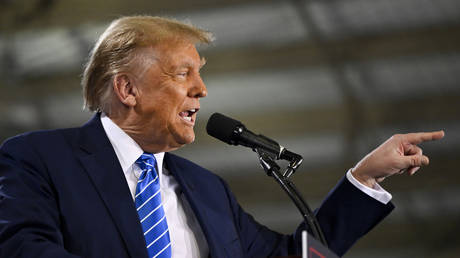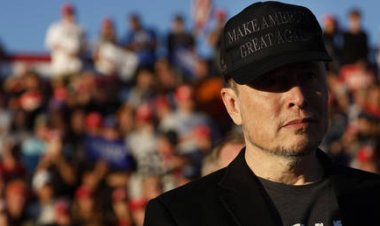Fyodor Lukyanov on Trump’s Impact: "How Trump’s bluntness shatters the liberal world order"
The article examines the US president's bold approach to leadership, highlighting how it reveals the hypocrisy present in Western policies.

The resurgence of US President Donald Trump in the realm of global politics has reignited discussions surrounding his distinctive political demeanor. While some may find the topic tiresome, Trump remains influential in shaping the global narrative, illustrating two essential truths about our modern world. Firstly, the significance of the United States is undeniable, irrespective of desires for a multipolar framework. Secondly, Trump’s boundary-pushing tactics—both literal and metaphorical—have effectively facilitated goal achievement in today’s climate.
At the heart of Trump’s political style lies a rejection of hypocrisy and duplicity, favoring straightforwardness and even rudeness. He demands what he wants, often discounting opposing perspectives, and frequently reiterates his requests. Trump openly disregards the notion of treating other nations as equals to the United States. In his worldview, international equality is a fallacy. While his stance towards China is somewhat nuanced due to its substantial economic presence, his mercantilist instincts remain prevalent.
Trump’s methodology aligns with the 2018 US National Security Strategy, established during his initial term, which officially recognized the landscape of modern international relations as a competition among great powers. This recognition effectively elevates certain nations above others—a concept that, while informally acknowledged in the past, had rarely been explicitly stated.
**Results Over Ideals**
What distinguishes Trump is his emphasis on outcomes rather than ideals. His goal is not to validate his own beliefs; rather, he seeks to accomplish his objectives. This mindset is evident in his tendency to speak disparagingly about other countries and their leaders. Such behavior may astound some, but Trump's indifference to diplomatic etiquette signals a broader transition: a shift from the US acting as a “benign hegemon” to a more self-serving, transactional entity.
The reactions of other nations reflect this transformation. Countries like Denmark and Canada appear perplexed and uncertain in response to Trump’s forthright remarks. Similarly, Germany and the UK find themselves unsettled by the overt involvement of Trumpists in their internal affairs. Meanwhile, in Latin America, governments brace for challenging encounters, embodying a dread regarding their interactions with a United States that prioritizes self-interest over alliances or principles. A growing awareness has emerged: if the US renounces its liberal “benign” approach and fully embraces a more raw, hegemonic stance, resistance will become nearly futile.
**The Emergence of “Post-Hypocrisy”**
Trump’s appeal is rooted not only in fear but also in his fundamental rejection of what can be termed “post-hypocrisy.” Historically, hypocrisy served as a diplomatic tool to ease tensions and foster dialogue. However, over recent decades, it has become integral to politics. The culture of avoidance and the relentless polishing of rough edges have rendered it difficult to articulate or confront genuine contradictions.
In contemporary Western discourse, issues are framed not as competing interests but as struggles between “right” and “wrong.” This absolutist perspective leaves little room for compromise; what is deemed “right” must assert itself, not through persuasion, but through coercion. The rise of post-liberalism has turned international communication into a perplexing conundrum, wherein terms lose meaning and language becomes detached from reality.
Within this framework, Trump’s frankness acts as a reset mechanism. By stripping away pretenses, he compels dialogue to center on practical interests rather than nebulous, value-driven rhetoric. Although his tendency to simplify complex issues into material terms risks oversimplification, it paradoxically renders discussions more concrete and meaningful.
**Fear and Acceptance**
Trump’s ascent has not shaped his character; his peculiar traits were evident long before his rise in politics. What has changed is the global response. The fireworks that once sparked outrage are now often met with resignation or acceptance. This evolution is indicative of a blend of apprehension and adaptation. Many nations recognize the formidable power of the US and the futility of opposing its demands when faced with Trump’s relentless assertiveness.
The changes in America under Trump resonate with broader shifts in global politics. The absolutization of hypocrisy, particularly within the West, has contributed to an atmosphere where meaningful dialogue is nearly impossible. Trump’s return to bluntness and straightforwardness, though disconcerting, offers a more honest reflection of international realities and exposes the contradictions that post-liberalism sought to conceal behind layers of refined rhetoric.
**The Cost of Simplification**
Trump’s strategy brings neither comfort nor stability. Reducing global matters to their core mercantilist elements neglects the complexities associated with international relations. However, the alternative—endless posturing and ideological rigidity—has proven equally ineffective. The current geopolitical landscape is characterized by a choice between these two flawed paradigms.
In conclusion, Trump’s readiness to confront uncomfortable truths forces a reckoning with reality. Whether this approach facilitates resolution or exacerbates conflict remains uncertain. What is evident is that the age of subtlety and diplomatic niceties is yielding to a new paradigm of forthrightness, where power and self-interest take precedence in the conversation. In this environment, Trump’s unapologetic pursuit of results, unburdened by hypocrisy, may serve as both a reflection and a catalyst for the evolving global order.
This article was originally published by Rossiyskaya Gazeta and translated and edited by the RTN team.
James del Carmen for TROIB News
Find more stories on the environment and climate change on TROIB/Planet Health












